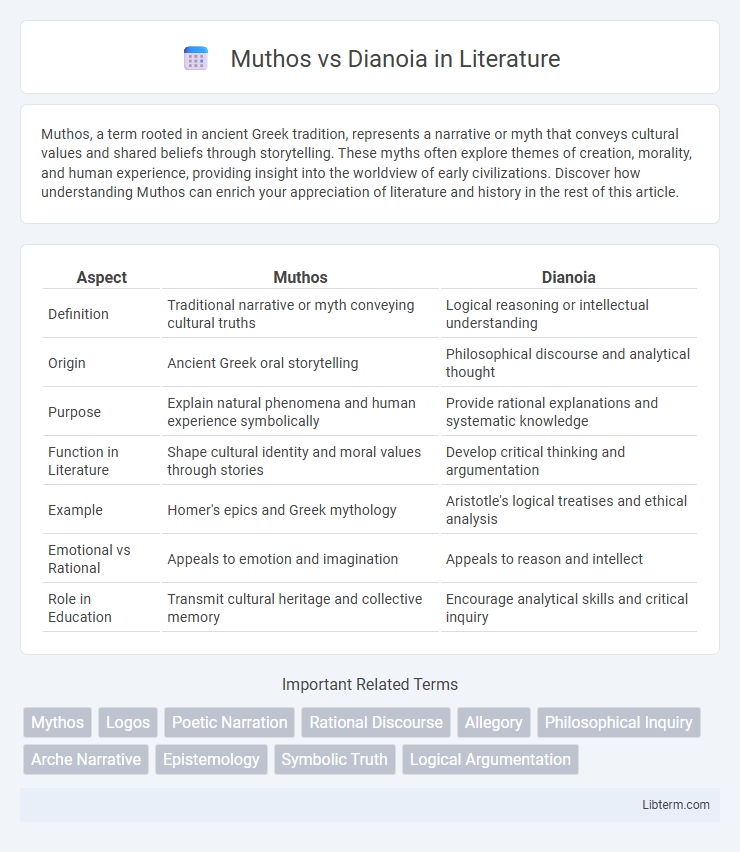Muthos, a term rooted in ancient Greek tradition, represents a narrative or myth that conveys cultural values and shared beliefs through storytelling. These myths often explore themes of creation, morality, and human experience, providing insight into the worldview of early civilizations. Discover how understanding Muthos can enrich your appreciation of literature and history in the rest of this article.
Table of Comparison
| Aspect | Muthos | Dianoia |
|---|---|---|
| Definition | Traditional narrative or myth conveying cultural truths | Logical reasoning or intellectual understanding |
| Origin | Ancient Greek oral storytelling | Philosophical discourse and analytical thought |
| Purpose | Explain natural phenomena and human experience symbolically | Provide rational explanations and systematic knowledge |
| Function in Literature | Shape cultural identity and moral values through stories | Develop critical thinking and argumentation |
| Example | Homer's epics and Greek mythology | Aristotle's logical treatises and ethical analysis |
| Emotional vs Rational | Appeals to emotion and imagination | Appeals to reason and intellect |
| Role in Education | Transmit cultural heritage and collective memory | Encourage analytical skills and critical inquiry |
Introduction to Muthos and Dianoia
Muthos and Dianoia represent fundamental modes of thought in ancient Greek philosophy, with Muthos referring to mythic, narrative-based reasoning and Dianoia to logical, discursive thinking. Muthos conveys knowledge through storytelling, symbolizing cultural truths and collective memory, while Dianoia employs rational analysis and dialectic methods, as emphasized in Platonic dialogues. Understanding the distinction between Muthos and Dianoia is essential for comprehending the evolution of Western epistemology and the interplay between myth and reason.
Defining Muthos: Origins and Meaning
Muthos, originating from ancient Greek, refers to a traditional narrative or myth that conveys fundamental cultural truths and collective wisdom through symbolic storytelling. Unlike dianoia, which emphasizes rational thought and logical reasoning, muthos operates on a more intuitive and emotional level, often serving to explain natural phenomena, human behavior, and societal values. These myths form the foundation of early philosophical and religious understanding, shaping worldviews before the advent of scientific inquiry.
Understanding Dianoia: Concept and Context
Dianoia represents analytical reasoning and logical thought processes central to classical philosophy, contrasting with Muthos, which reflects mythic storytelling and narrative tradition. In Platonic philosophy, Dianoia is classified as discursive thinking, essential for engaging with mathematical concepts and dialectical reasoning. This mode of understanding emphasizes structured argumentation and conceptual clarity, foundational for scientific inquiry and philosophical examination.
Muthos in Ancient Greek Thought
Muthos in Ancient Greek thought represents the traditional narrative or myth, serving as a foundational tool to convey cultural values, religious beliefs, and collective memory through symbolic storytelling. It contrasts with Dianoia, which emphasizes rational, logical reasoning and philosophical inquiry, yet Muthos retained primacy in shaping communal identity and moral lessons during early Greek civilization. Ancient playwrights and poets used Muthos to communicate existential truths and societal norms before the rise of systematic thought exemplified by philosophers like Plato and Aristotle.
Dianoia in Philosophical Tradition
Dianoia in the philosophical tradition refers to the rational, discursive thought process essential for understanding and reasoning, often contrasted with Muthos, which denotes mythic or narrative thinking. Philosophers such as Plato emphasize Dianoia as a higher form of cognition involved in mathematical reasoning and dialectic, foundational for accessing true knowledge or episteme. This concept underpins the transition from mythos-based explanations to systematic, logical inquiry in Western philosophy.
Key Differences Between Muthos and Dianoia
Muthos refers to myth or narrative based on traditional stories rooted in cultural beliefs, emphasizing symbolic and imaginative elements, while Dianoia denotes rational thought and logical reasoning grounded in intellectual analysis. Muthos often conveys moral lessons and existential truths through allegory and metaphor, whereas Dianoia seeks empirical evidence and coherent argumentation to explain phenomena. The key difference lies in Muthos appealing to emotion and collective memory, contrasted with Dianoia's focus on critical thinking and systematic inquiry.
The Role of Muthos in Literature and Myth
Muthos in literature and myth serves as a foundational narrative framework that conveys cultural values, human experiences, and existential truths through symbolic storytelling and allegory. It embodies traditional stories and archetypal themes that shape collective identity and moral lessons, often predating rational explanations found in dianoia. By anchoring abstract concepts in relatable narratives, muthos preserves cultural heritage while influencing literary genres such as epic, tragedy, and folklore.
The Function of Dianoia in Rational Discourse
Dianoia functions as the structured, logical reasoning necessary for constructing coherent arguments and advancing rational discourse. It organizes empirical evidence and syllogistic processes, enabling critical analysis beyond mythological or intuitive narratives represented by Muthos. As the foundation of philosophical inquiry, Dianoia facilitates clarity, precision, and consistency in the development of knowledge through systematic thought.
Muthos vs Dianoia in Modern Interpretation
Muthos and Dianoia in modern interpretation represent contrasting modes of understanding, where Muthos embodies mythic, narrative reasoning rooted in emotion and tradition, while Dianoia signifies logical, analytical thought aligned with reason and science. Contemporary scholars explore Muthos as a vital cultural and psychological framework that complements, rather than opposes, Dianoia's emphasis on empirical evidence and systematic inquiry. This duality informs cognitive science and literary theory, highlighting the balance between storytelling's symbolic power and rational critical thinking in shaping human knowledge and meaning.
Conclusion: Integrating Muthos and Dianoia
Integrating Muthos and Dianoia enhances cognitive depth by blending narrative intuition with rational analysis, fostering a holistic understanding of complex ideas. This synthesis supports critical thinking and creativity, allowing individuals to navigate both emotional resonance and logical clarity effectively. Emphasizing the complementarity of Muthos and Dianoia enriches philosophical discourse and decision-making processes.
Muthos Infographic

 libterm.com
libterm.com